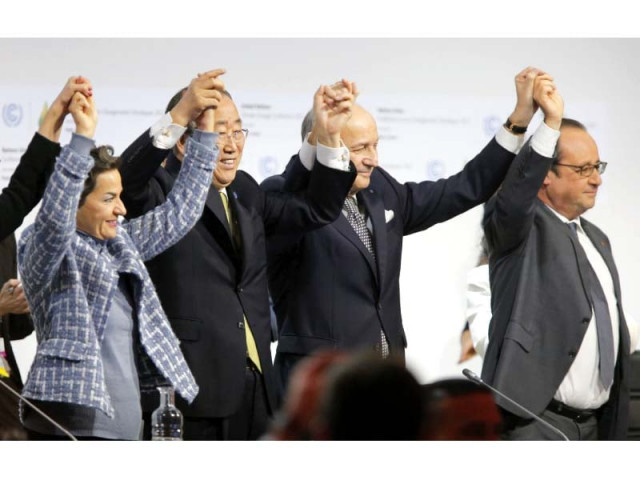195 nations seal climate deal
Pact offers hope that humanity can avert catastrophic climate change

Leaders raise hands after adoption of the global warming pact. PHOTO: AFP
To rousing cheers and tears of relief, envoys from 195 nations approved Saturday an accord to stop global warming, offering hope that humanity can avert catastrophic climate change and usher in an energy revolution.
French Foreign Minister Laurent Fabius ended nearly a fortnight of gruelling UN negotiations in Paris with the bang of a gavel, marking consensus among the ministers, who stood for several minutes to clap and shout their joy.
“I see the room, I see the reaction is positive, I hear no objection. The Paris climate accord is adopted,” Fabius declared.
Turning to a little green hammer with which he formally gave life to the arduously-crafted pact, he quipped: “It may be a small gavel but it can do big things.”
The deal, to take effect from 2020, ends decades-long rows between rich and poor nations over how to carry out what will be a multi-trillion-dollar effort to cap global warming and deal with consequences already occurring.
With 2015 forecast to be the hottest year on record, world leaders and scientists had said the accord was vital for capping rising temperatures and averting the most calamitous impacts from climate change.
Without urgent action, they warned of increasingly severe droughts, floods and storms, as well as rising seas that would engulf islands and coastal areas populated by hundreds of millions of people.
The crux of the fight to limit global warming requires cutting back or eliminating the use of coal, oil and gas for energy, which has largely powered prosperity since the Industrial Revolution began in the 1700s.
The burning of those fossil fuels releases invisible greenhouse gases, which cause the planet to warm and change Earth’s delicate climate system.
Ending the vicious circles requires a switch to cleaner sources, such as solar and wind, and improving energy efficiency. Some nations are also aggressively pursuing nuclear power, which does not emit greenhouse gases.
The Paris accord sets a target of limiting warming of the planet to “well below” 2.0 degrees Celsius compared with the Industrial Revolution, while aiming for an even more ambitious goal of 1.5C.
To do so, the emissions of greenhouse gases will need to peak “as soon as possible”, followed by rapid reductions, the agreement states.
The world has already warmed almost 1C, which has caused major problems for many people around the world particularly in developing countries, such as more severe storms, droughts and rising seas, according to scientists.
Environment groups said the Paris agreement was a turning point in history and spelt the demise of the fossil fuel industry, pointing particularly to the significance of the 1.5C goal.
Published in The Express Tribune, December 13th, 2015.



















COMMENTS
Comments are moderated and generally will be posted if they are on-topic and not abusive.
For more information, please see our Comments FAQ